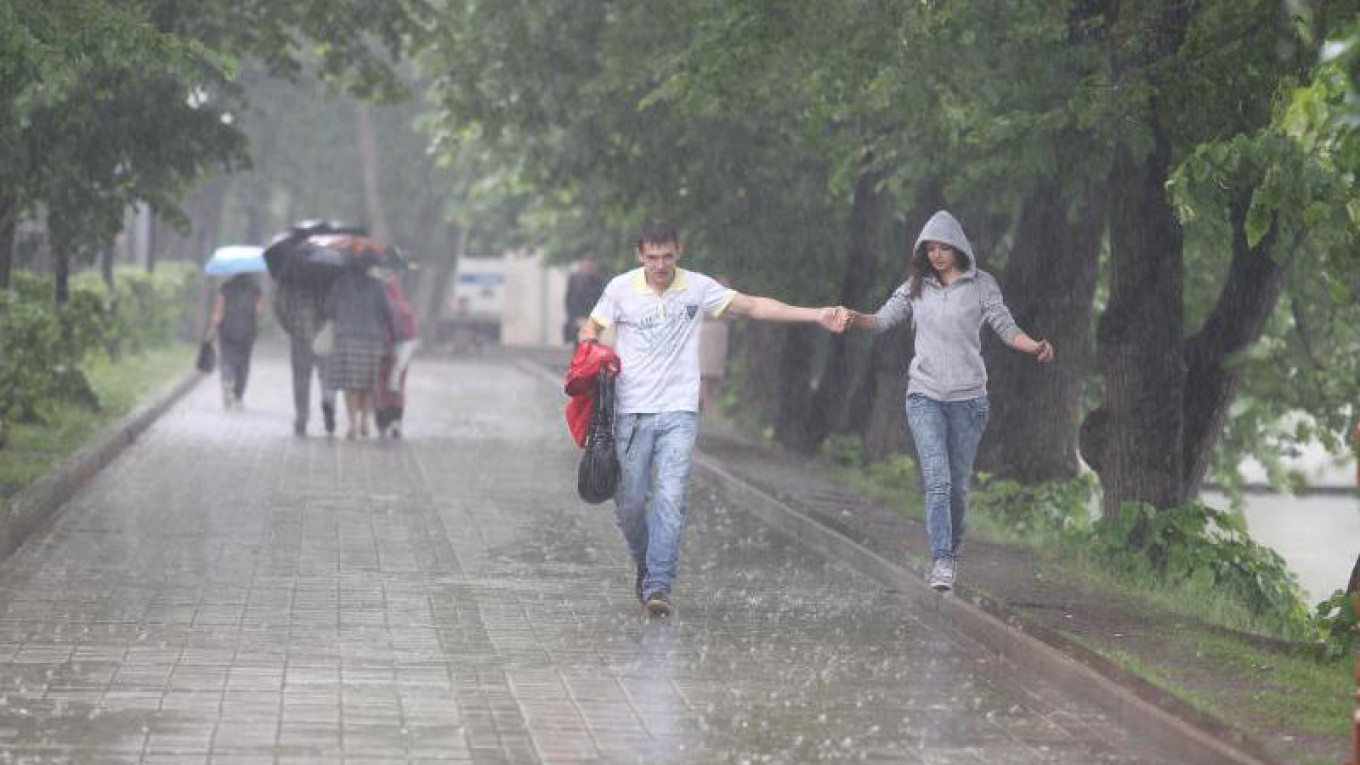Мокрый: wet
This is not one of Moscow’s really wet summers — the ones when your umbrella never really dries out and you live in your wellies — but we’ve had a good dose of spectacular thunderstorms and record-breaking downpours. That means that you probably got caught in the rain — and you didn’t just get wet, you got drenched.
Because you are human, you will want to describe your wet misfortune as expressively as you can to your significant other. Here, Russian is weak on verbs, but rich in adverbial phrases.
The basic “I got drenched” verb pair is промокать / промокнуть (to become thoroughly wet). You use the first part of the pair (imperfective) when you’re talking about the process. Он стал промокать (He began to get really wet.) Промокнуть (perfective) is the one you use when you’re already sopping wet. Начался дождь, ветер, мы все промокли (The rain began, the wind blew up, and we all got soaked.)
Now, that’s not too satisfying, is it? You’re not going to get tea and sympathy from “я промок.” Add an adverbial phrase, like насквозь (all the way through): Дождь хлынул, и я промокла насквозь (The clouds opened and I was drenched through and through). Or до нитки (to every last thread): Очень скоро мы промокли до нитки (Very soon our clothes were sopping wet.) Or even deeper, до костей (down to your bones), although English doesn’t let you go that far: Он попал в грозу и промок до костей (He got caught in a storm and was soaked to the skin.)
In Russian, your eyes can also get wet: У отца промокли глаза, но лишь на мгновение (My father’s eyes filled with tears, but for just an instant.) Or you can wet something intentionally: Она промокала своё лицо влажной губкой (She moistened her face with a damp sponge.)
The other way of getting wet in Russian is from the inside out: потеть (to sweat). You can use the same verb for getting soaked: Было жарко, низкорослые болотные деревца тени давали немного, гимнастёрки промокли от пота (It was hot, the low swampy trees didn’t give much shade, and the soldiers’ shirts were drenched with sweat.)
In English, when you are wet and bedraggled, you look like a drowned rat. In Russian, you are мокрый, как мышь (wet as a mouse). No one seems to have a good explanation for the origins of the wet mouse simile, unless you believe that mice sweat a lot while running on their wheel. In any case, the expression means being drenched in sweat either due to illness or hard work. У неё держалась температура, и она лежала мокрая, как мышь (She had a fever that wouldn’t break and lay in bed, soaked with sweat.) Он колол дрова, пришёл мокрый, как мышь (He cut firewood and came home drenched in sweat.)
Sweating is often a metaphor for working hard: Они заставляли президентскую команду попотеть (They really made the president’s team sweat and toil.) Работать до седьмого пота (work until the seventh sweat) is an odd expression in which the number seven really just means “a lot”: Одни спину гнут, работают до седьмого пота, а другие, выходит, живут за их счёт (Some do back-breaking labor, work until they are covered in sweat, while others, it turns out, live off them.)
Ain’t that the truth. Wet rodents of the world — unite!
Michele A. Berdy is a Moscow-based translator and interpreter, author of “The Russian Word’s Worth,” a collection of her columns.
A Message from The Moscow Times:
Dear readers,
We are facing unprecedented challenges. Russia's Prosecutor General's Office has designated The Moscow Times as an "undesirable" organization, criminalizing our work and putting our staff at risk of prosecution. This follows our earlier unjust labeling as a "foreign agent."
These actions are direct attempts to silence independent journalism in Russia. The authorities claim our work "discredits the decisions of the Russian leadership." We see things differently: we strive to provide accurate, unbiased reporting on Russia.
We, the journalists of The Moscow Times, refuse to be silenced. But to continue our work, we need your help.
Your support, no matter how small, makes a world of difference. If you can, please support us monthly starting from just $2. It's quick to set up, and every contribution makes a significant impact.
By supporting The Moscow Times, you're defending open, independent journalism in the face of repression. Thank you for standing with us.
Remind me later.





